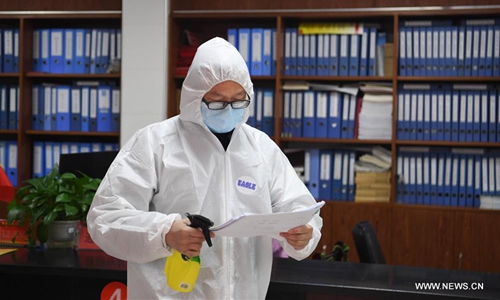NOVEL CORONAVIRUS / FEATURE
Public health education needed amid virus outbreak

A community worker checks residents' information in Caidian District of Wuhan, central China's Hubei Province, Feb. 7, 2020. Wuhan, the epicenter of the novel coronavirus outbreak, is combing communities to ensure every confirmed or suspected patient is located and attended to. (Xinhua/Cheng Min)
As China still engages in the arduous fight against the novel coronavirus outbreak, some people have already begun to reflect upon China's weakness in the basic public health education.
If we analyze how the novel coronavirus epidemic broke out and what measures governments at various levels have taken to fight the deadly virus in the past month, we could find a broad lack of public health knowledge, and as a result, inadequacies in our dealing with the epidemic.
Most of us may have forgotten the dear price China and the Chinese people have paid for the 2003 SARS outbreak. If China had implemented nationwide public health education, including knowledge about infectious diseases, perhaps the whole nation wouldn't have been so unprepared for the outbreak of the novel coronavirus this time.
The death of ophthalmologist Li Wenliang, who died of the virus and who was among the first group of professionals to warn against the virus before its outbreak, has triggered public grief and anger. Some people feel regretful that his early warning was somewhat neglected, as a different scenario may have taken place if local authorities were knowledgeable enough to be sensitive toward his warning so that Wuhan, the epicenter of the outbreak, and the whole country would have been more prepared to curb the spread of the virus.
And after the outbreak, the public panic also exposed a lack of public health knowledge. How should we wear masks? To what extent do masks help? Should ordinary people wear protective outfits and goggles in ordinary places? When all kinds of information float in social media, there are not many easily accessible authoritative channels for the public to get correct information, making the national fight against the epidemic even more arduous and complicated.
After the SARS outbreak in 2003, China professionalized its public health system by building emergency and preparedness infrastructures as well as training public health professionals in epidemiology and related scientific fields. These are necessary "hard" steps to address potential public health emergencies.
But what is missing here is the "soft" approach - education. Education on public health can give people knowledge on matters related to their health and life and empower people with the right approaches when confronting them. This is the lesson China should have learned after the 2003 SARS outbreak.
In addition to the knowledge required in public health, the Chinese people also have to reflect on some of their habits which do not match the 21st century. Although it is too much and too racist to make up videos suggesting Chinese people's "dirty" eating habits, in particular the consumption of wildlife, a supposed cause of the virus outbreak, some Chinese do need to abide by the norms of human diets. Also, unpleasant, uncivilized customs such as spitting can be corrected only with repeated education, perhaps in more than a generation's time.

